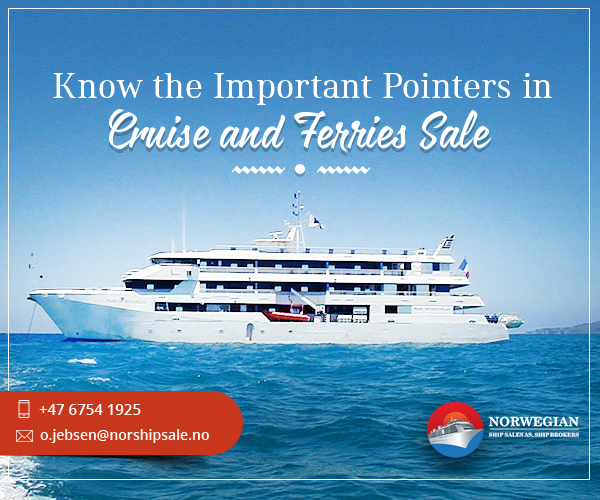Cruise sailing is primarily for experiencing luxurious vacation while Ferries are used for general transportation needs. The Cruise and ferries industry is rapidly growing. In the year 2016 the cruise industry has drawn an estimated 22 million passengers across the world. The global cruise market has earned $39.6 billion within year 2008 to 2015. The ferry industry across nations, commutes around 2.1 billion passengers per year in addition to 250 million vehicles and 32 million trailers. It is considered as one of the safest mode of transportation.
Some of the Important Pointers in Cruise and Ferries Sale
Ferry and Cruise vessels are sold on the factors like,
Overall rating by experts and user, Year of make, Class, Length over all (LOA), Breath overall (BOA), Cruise type (Deep sea, Coastal, River), PAX or Passenger capacity, Beam, Draft, Crew to guest ratio, Speed, Amount of elbow room, suitability for family with age specific facilities, Space for day time activities, Cabin, Deck plan etc.
According to CLIA Travel Agent Survey statistics, factors working most for cruise booking are: Value/Price (86,6%), Itineraries (77,7%), Cruise line reputation (76%), Departure port (61,3%), and Amenities (39,3%).
Factors that affect business of cruise and ferries are weather conditions, social unrest, the economy, competition, political instability and exchange rates.
The domain of ship sale demands thorough knowledge of its terminologies. To interest potential buyers, the ship design, its purpose and construction need to be communicated with clarity. In addition to informing the routes and probable meteorological occurrence, it is imperative that clients are told about size, capability and specialization of the ship building yards.
Registration of ship are of two types. Registration of owner’s own country or offshore registration. Both of them have their pros and cons and a ship broker has significant role in modifying such registration. Each vessel needs to be classified and their sale is depended on it. Here also a broker can have a role in changing the classification of a ship.
In recent times the cruise and ferry industry is focusing on energy efficient operations. The customers demand clean and green operations. Ways like, energy efficient ports, rerouting in stormy weather, regular maintenance to control wear and tear, propeller polishing, upgradation of engine and other components have a big impact on fuel cost and thus play significant role in greener solutions.
Some of the Challenges in the Cruise Business
- Attracting first time travellers as passengers are prone to select their first choice repeatedly
- Huge vessels with overcapacity give enormous discounts pose difficulty for other businesses
- Set perceptions on cruise as being expensive and boring
- Air passenger duty has a major impact even on the fly-cruise deals market (discounted flight and cruise packages)
Inspite of challenges, all the huge potential and newer markets developing in Asia and Australia, ferry and cruise vessels for sale will remain a hotbed for serious business. While the giant players occupy big portions of the market, there are many who have strong potential for a good market impact.


